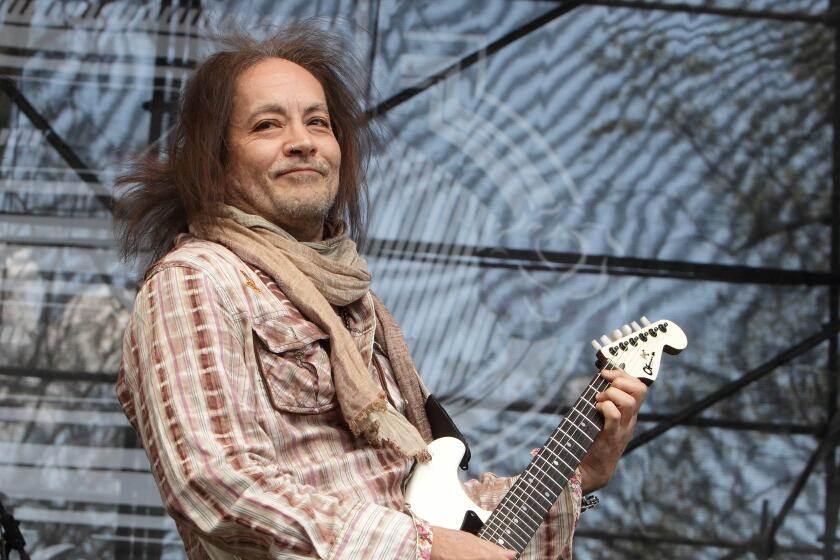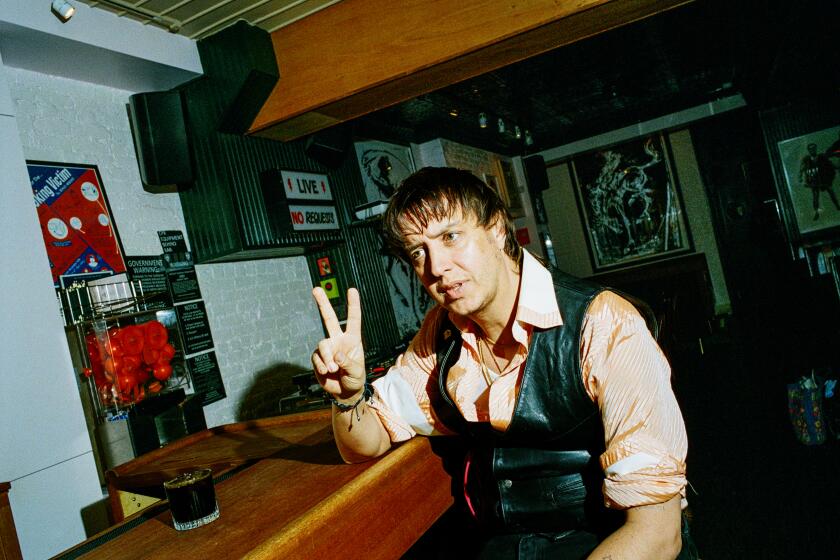O.C. POP MUSIC REVIEW : Nevilles’ Performance Is Simply Astonishing
The Neville Brothers stand for family, community and tradition--if this great New Orleans band wasn’t so palpably, incontrovertibly alive and true, you would think it was the lip-service invention of some momentarily values-conscious politician.
If only our political life could be governed by the exacting standards and high ideals that guided the four Nevilles and their three-man rhythm section Wednesday night in the first show of a two-night stand at the Coach House.
From the purely utilitarian viewpoint (which seems to be what counts most with our technocratic politicos these days), the Nevilles’ 1-hour, 45-minute set was astonishing. The seven musicians have impressive individual skills (in the case of Aaron Neville’s angelic tremor of a voice, make that an unsurpassed skill) that have been honed and melded into an interactive system. The Nevilles are organic, in the way that your own heart, lungs and veins are organic. Each vital part functions. Breath circulates. Blood flows. The musical body lives and moves to a churning, always active rhythmic pulse.
Making the music sound as natural as breathing is a rare enough accomplishment. But what about what President Bush, in one of his more eloquent constructions, has dubbed “the vision thing”? The Nevilles’ power of vision and inspiration was evident in their show’s concluding benediction.
It started with Aaron Neville’s voice rising sweetly alone as he sang “Amazing Grace,” the hymn of a repentant slave ship captain. Then a reggae beat emerged, and the music veered between the ideals of Bob Marley--”One love, one heart”--and the universalist call of the soul ballad, “People Get Ready.”
The Nevilles had merged the confession of a slave trader with the spiritual voice of his victims’ heirs, as if to say that there really is a unity in the human enterprise, that perhaps history’s sequence of evils will one day be set right. That is hard to believe in a time when some agents of racial justice receive bombs in their mail, but you could almost feel redemption as a possibility as the Nevilles closed their show, smiling, embracing each other and flashing peace signs while oldest brother Art played a lovely hymn on the organ.
Even without that inspiring, meaning-filled finale, the Nevilles’ show would have been a marvel and an example of another important social value: the need for a history, a tradition, a sense of cultural roots as a base for a broader experience of life.
New Orleans R&B; music is the Nevilles’ tradition. As is their custom, they celebrated it near the end of their set, with Mardi Gras parade music--fiery and joyful, a percussive, polyrhythmic delight. Songs like “Iko Iko” and Professor Longhair’s “Big Chief” are the foundation for the Nevilles’ own contribution to the New Orleans tradition. They have extended that tradition by merging straight New Orleans R&B; with elements of rock and African rhythm. That blend came out in such original songs as “Hey Pocky Way,” “Africa” and “Fire on the Bayou,” which featured some surprising progressive-rock keyboard constructions from Art Neville.
With a handed-down tradition behind them, and their credentials for furthering that tradition well established, the Nevilles have the confidence to branch out in every which way.
Charles Neville’s taut, snaky saxophone lines gave the band a sophisticated, jazz-based element (his intense instrumental duet during “Yellow Moon” with guitarist Brian Stoltz was one of the interactive highlights of a show that was as musically interactive as they come).
Dreadlocked percussionist Cyril Neville sang with a husky political soul-singer’s fervor on such reggae- or Afro-beat message songs as “My Blood” and “Wake Up.” And a melting pot of pop ingredients turned up in unexpected places: Here, a snippet from the Moody Blues’ “Go Now”; there, in Nevillized form, the chorus refrain from, of all things, “Whole Lotta Love” by Led Zeppelin.
Elsewhere, a touch of Sly Stone’s “I Want to Take You Higher,” and even a quotation of the “Batman” TV theme, courtesy of bassist Tony Hall.
In the middle of the set, the Nevilles played their trump card: Aaron Neville singing two ballads. First came his 1966 soul hit, “Tell It Like It Is,” sung just like the record for the simple reason that you don’t mess with perfection.
Then came a ghostly, hushed version of Bob Dylan’s “With God on Our Side,” in which the fluid quavering of Neville’s unaided, perfectly controlled voice achieved the sort of dramatic echo and aura that lesser singers have their sound crew provide with electronic effects.
Between the profound sadness and beauty of those ballads and the raw celebration of an “Iko Iko” or a “Big Chief” lies a musical and emotional expanse that only an exemplary band could hope to bridge.
More to Read
The biggest entertainment stories
Get our big stories about Hollywood, film, television, music, arts, culture and more right in your inbox as soon as they publish.
You may occasionally receive promotional content from the Los Angeles Times.











